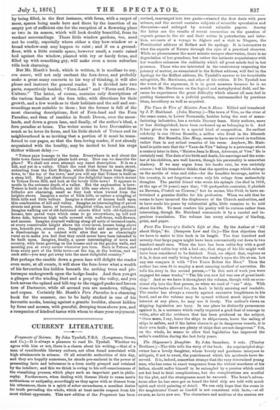The Vaux de Vire of Maistre Jean is Roux. Edited
and translated by J. P. Muirhead. (John Murray.)—The town of Vire, as the river of the same name, in Lower Normandy, besides being the seat of manu- facturing industries, has a certain literary fame. Sixty authors, more or less distinguished, have been reckoned up as belonging to it. And it has given its name to a special kind of composition. Its earliest celebrity is one Oliver Basselin, a miller who lived in the fifteenth century. But Basselin, like lEsop, seems to have survived in tradition rather than in any actual remains of his verse. Anyhow, Mr. Muir- head is quite sure that the " Vaux-de-Vire " belong to a personage about a century later in date, "Maiatre Jean le Houx, Advocate, of Vire." He is certainly real. The date of his birth and death, his marriage and the num- ber of his children, are well known, though his personality is somewhat shadowy. If we may argue from his laudes vini, he was certainly vinosus ; but his translator thinks that the sportive songs which enlarge on the merits of wine and cider—for the humbler beverage, native to his country, is not forgotten—were only his refuge from melancholy thoughts. The partial friend who wrote his epitaph (he died in 1616, at the age of 70 years) says that, "Si quelquefois contraint, fl plaidoit au Barreau, C'estoit un Ciceron ;" but he seems, like Ovid, to have en- tertained a genuine dislike for his profession. When we add that he seems to have incurred the displeasure of the Church authorities, and to have made his peace by substantial gifts, little remains to be told about his life. To most readers his poetry will be curious rather than interesting, though Mr. Muirhead commends it by a careful and in- genious translation. The volume has every advantage of binding, print, and paper.


































 Previous page
Previous page